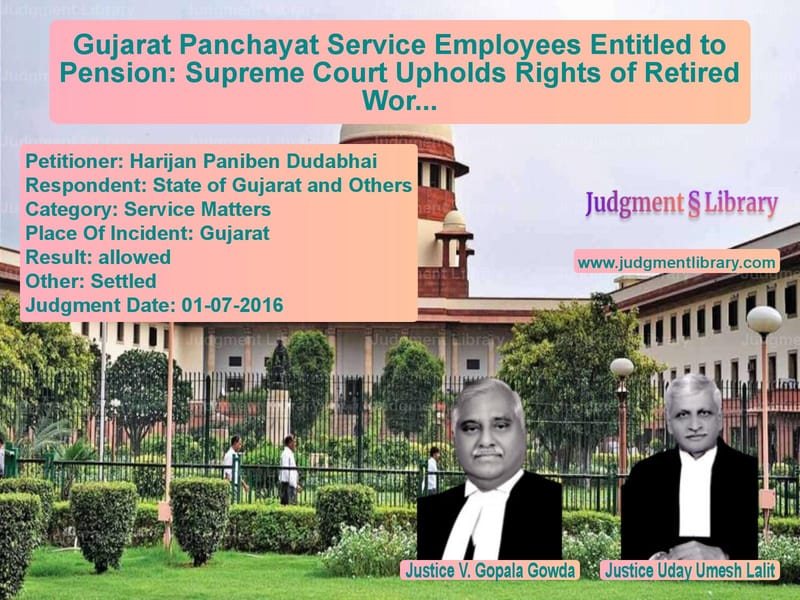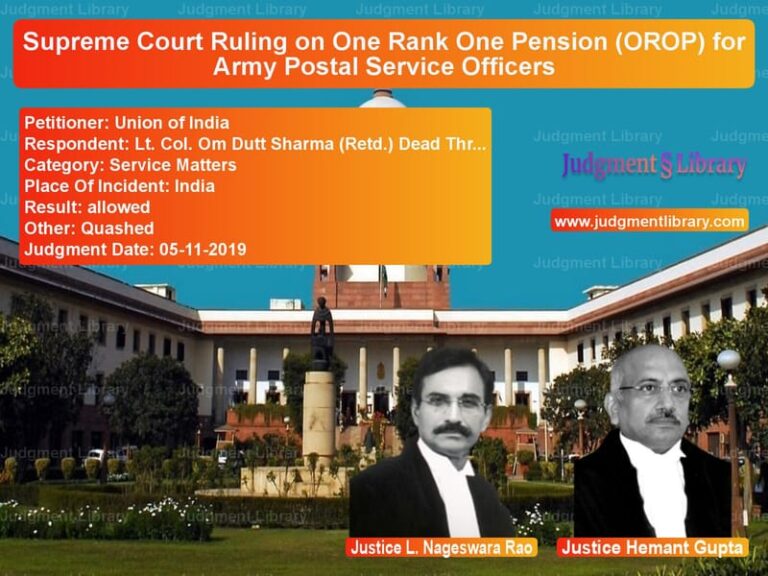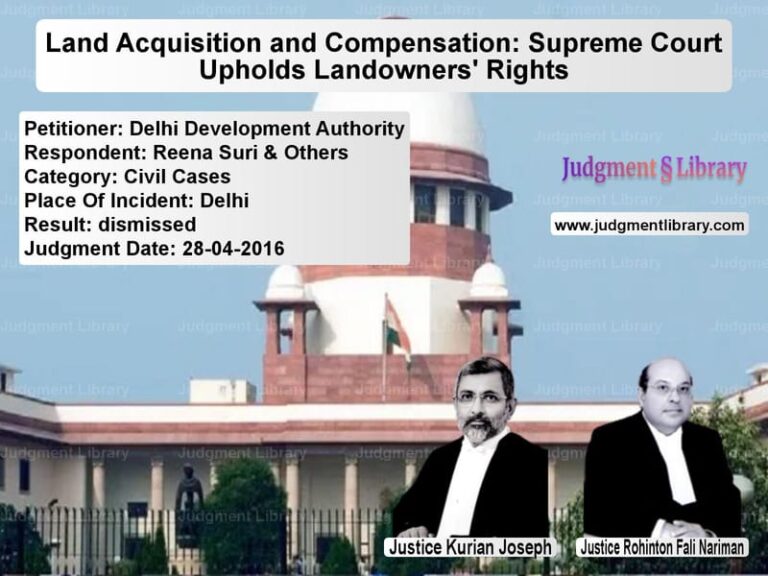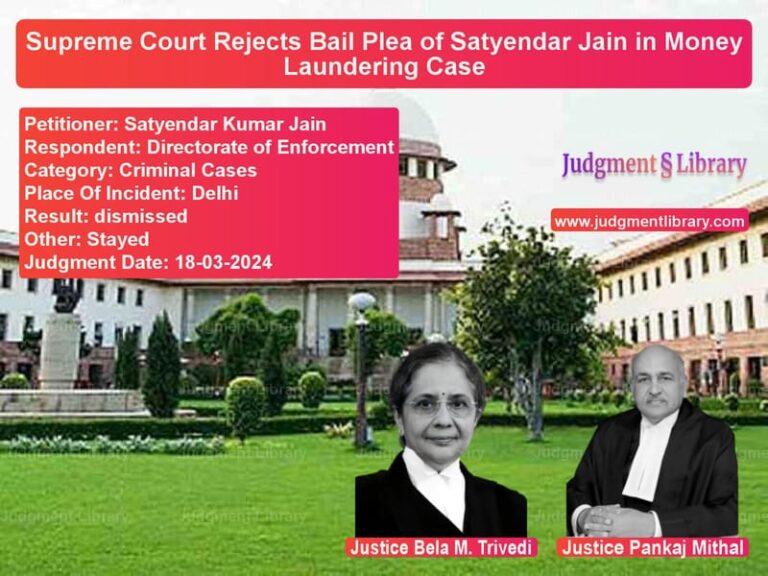Gujarat Panchayat Service Employees Entitled to Pension: Supreme Court Upholds Rights of Retired Workers
The case of Harijan Paniben Dudabhai vs. State of Gujarat & Others revolves around the entitlement of retired Gujarat Panchayat Service employees to pensionary benefits. The Supreme Court, in a landmark decision, ruled in favor of the petitioners, holding that employees appointed by Gram Panchayats before the formulation of recruitment rules were still entitled to pension and gratuity.
Background of the Case
The appeals were filed by retired or deceased employees of various Gujarat Gram Panchayats who had served for several decades but were denied pension and gratuity by the state government. The key issue before the Court was whether these employees, whose appointments were made without a formal selection process, were entitled to retirement benefits.
The appeals challenged a common judgment by the Gujarat High Court, which had denied pensionary benefits on the ground that the appointments were not made under the prescribed recruitment rules.
Legal Issues Raised
The primary legal questions before the Supreme Court were:
- Whether employees appointed by Gram Panchayats before the Gujarat Panchayat Service Rules came into force were entitled to pension.
- Whether long-term employment and regular salary payments established an implied recognition of service.
- Whether employees who were appointed through Panchayat resolutions, without formal recruitment procedures, could be denied pensionary benefits.
Arguments of the Petitioners
The petitioners, represented by senior advocates, contended:
- That they had served for over three decades in full-time positions and were paid salaries regularly.
- Their appointments were made by Gram Panchayats, which were the competent appointing authorities at the time.
- The Gujarat government had, in a 2008 circular, acknowledged the service of similar employees and granted them pension benefits.
- Denying pension after decades of service would be unjust and a violation of their legitimate expectations.
Arguments of the Respondents (State of Gujarat)
The Gujarat government argued:
- That the appointments were not made through the Gujarat Panchayat Service Selection Board and therefore were not valid.
- That the employees were not officially recognized as part of the Panchayat Service under Section 203 of the Gujarat Panchayats Act.
- That granting pension benefits would set a precedent that could lead to financial burdens on the government.
Supreme Court’s Observations
The Supreme Court, in its judgment, made several key observations:
- “The employees in question were appointed before the recruitment rules came into force. They served for decades without objection from the state.”
- “The principle of legitimate expectation applies here. Employees who worked for years with regular salaries cannot be denied pensionary benefits arbitrarily.”
- “The state’s argument that these employees were not part of Panchayat Service is flawed. Their continuous service and salary payments demonstrate de facto recognition.”
Key Extracts from the Judgment
The Court ruled:
“In the totality of circumstances, we find that the appellant cannot be denied the benefits in question. We, therefore, allow this appeal and set aside the judgments and orders rendered by the Single Judge and the Division Bench and allow Special Civil Application No. 354 of 2004.”
The Supreme Court further emphasized:
“The state cannot take advantage of its own failure to establish a proper recruitment process and then deny benefits to employees who were appointed in good faith.”
Final Judgment
The Supreme Court ruled:
- The High Court’s decision was set aside.
- The Gujarat government was directed to pay pension and gratuity to the retired employees and the families of deceased employees.
- All arrears of pension were to be paid with 9% interest within two months.
Impact of the Judgment
This decision has far-reaching implications:
- It provides relief to thousands of retired Gujarat Panchayat Service employees who were denied pension benefits.
- It reinforces the principle that long-term government employees cannot be denied their rightful benefits due to administrative lapses.
- It clarifies that recruitment irregularities by government bodies should not result in deprivation of legitimate rights of employees.
Conclusion
The Supreme Court’s decision in Harijan Paniben Dudabhai vs. State of Gujarat upholds the fundamental rights of government employees. By ensuring that retired employees receive their rightful pension, the judgment sets an important precedent in labor and administrative law. It serves as a reminder that the state has a duty to protect the interests of long-serving employees and cannot deny benefits on technical grounds after decades of service.
Don’t miss out on the full details! Download the complete judgment in PDF format below and gain valuable insights instantly!
Download Judgment: Harijan Paniben Duda vs State of Gujarat and Supreme Court of India Judgment Dated 01-07-2016-1741873069139.pdf
Direct Downlaod Judgment: Direct downlaod this Judgment
See all petitions in Pension and Gratuity
See all petitions in Public Sector Employees
See all petitions in Judgment by V. Gopala Gowda
See all petitions in Judgment by Uday Umesh Lalit
See all petitions in allowed
See all petitions in settled
See all petitions in supreme court of India judgments July 2016
See all petitions in 2016 judgments
See all posts in Service Matters Category
See all allowed petitions in Service Matters Category
See all Dismissed petitions in Service Matters Category
See all partially allowed petitions in Service Matters Category







